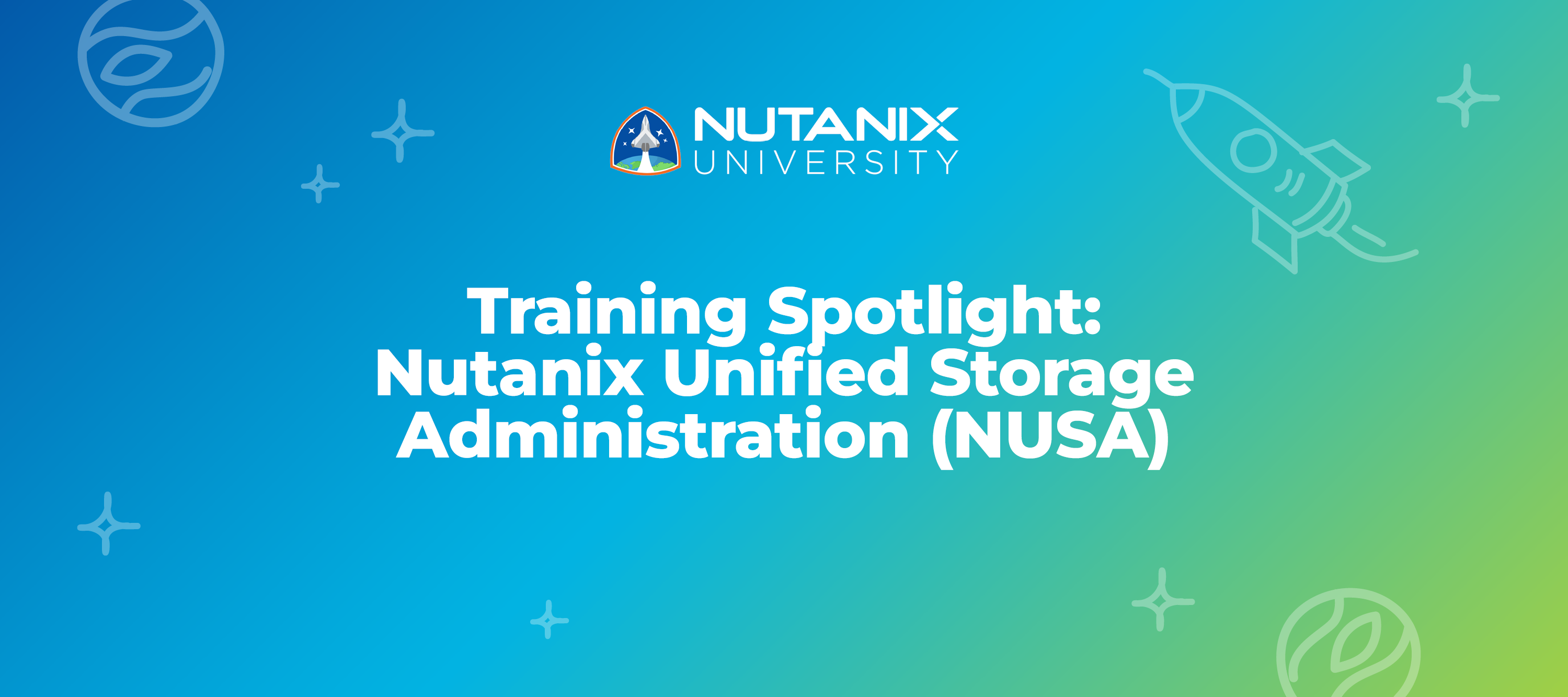Trying to find the right training course for you can seem like a daunting task. But it doesn’t have to be! In this blog series, we will spotlight each of our courses to help you choose the right one for your career goals.
At Nutanix University, we offer a variety of training courses all designed around flexibility and freedom. No matter which stage of the hybrid multicloud journey you’re on, whether it be learning basic fundamentals or performing at an advanced level, we have the perfect course fit for your needs.
Today, we will take a deep dive into our professional-level course: Nutanix Unified Storage Administration (NUSA).
What’s covered in NUSA?
This course teaches you the administrative skills needed to install, configure, manage, and upgrade three different Nutanix unified storage products:
- Nutanix Volumes: Learn how Nutanix Volumes provides block storage for your VMs or physical hosts using the iSCSI protocol, with the same simplicity as virtualized workloads, consolidating infrastructure into a single unified platform.
- Nutanix Files: Set up and manage Nutanix Files, a software-defined, scale-out file storage solution that provides Server Message Block (SMB) and Network File System (NFS) file services to clients.
- Nutanix Objects: Learn how easy it is to spin up Nutanix Objects in a few simple steps, and build a simple, secure, and scale-out stack.
Who should take it?
This course is great for system operators evaluating file, block, and object storage using Nutanix Files, Nutanix Volumes, and Nutanix Objects. It’s also great for IT administrators who manage Nutanix clusters and want a deep dive into Nutanix storage administration.
NUSA is perfect for anyone who’s interested in securing the Nutanix Certified Professional - Unified Storage (NCP-US) certification as it covers key objectives that are tested on the exam.
Are there any prerequisites?
This course requires basic system administration knowledge, acquired through training or hands-on experience. You should be familiar with iSCSI, SMB, NFS storage protocols, and S3 compatible storage; be able to create a VM through the Nutanix web console (Prism); and know how to run commands from the command line interface (CLI). You should also have an understanding of Nutanix core concepts and definitions, which can be found here.
If you do not have these skills, we recommend taking the Nutanix Hybrid Cloud Fundamentals (NHCF) class first.
Delivery format
- 2-day virtual instructor-led
- Comes with a free NCP-US exam voucher
- 10-hour self-paced online (free)
Learn more about NUSA and enroll here.
Stay tuned for future training spotlight features that will help you navigate the hybrid multicloud world.
Make sure to visit nutanix.com/training to find out about our other available courses.
This article was written by Karlie Beil, Customer Marketing Specialist.
©️️️️️ 2023 Nutanix, Inc. All rights reserved. Nutanix, the Nutanix logo and all Nutanix product, feature and service names mentioned herein are registered trademarks or trademarks of Nutanix, Inc. in the United States and other countries. Other brand names mentioned herein are for identification purposes only and may be the trademarks of their respective holder(s). This post may contain links to external websites that are not part of Nutanix.com. Nutanix does not control these sites and disclaims all responsibility for the content or accuracy of any external site. Our decision to link to an external site should not be considered an endorsement of any content on such a site. This post may contain express and implied forward-looking statements, which are not historical facts and are instead based on our current expectations, estimates and beliefs. The accuracy of such statements involves risks and uncertainties and depends upon future events, including those that may be beyond our control, and actual results may differ materially and adversely from those anticipated or implied by such statements. Any forward-looking statements included herein speak only as of the date hereof and, except as required by law, we assume no obligation to update or otherwise revise any of such forward-looking statements to reflect subsequent events or circumstances.

